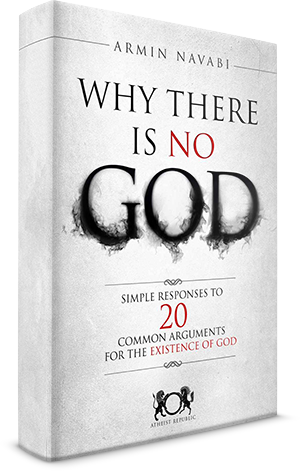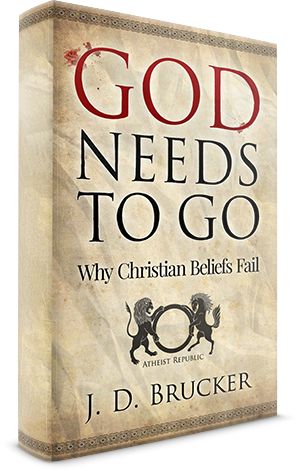Simply say to the theist:
(1) Theists don't observe themselves as omniscient.
(2) Theists 'want to' absolutely believe that God exists. (Impossible, due to (1), ie theists lack absolute awareness)
(3) Theists don't probably believe that God exists. (ie: they don't want to possess probabilistic belief in the existence of God)
So, they possess zero degrees of belief in God.
Lack of belief in God, is atheism.
Subscription Note:
Choosing to subscribe to this topic will automatically register you for email notifications for comments and updates on this thread.
Email notifications will be sent out daily by default unless specified otherwise on your account which you can edit by going to your userpage here and clicking on the subscriptions tab.





























Brilliant! The work of philosophy is now complete!
Do you detect any errors in the argument? @chimp3
Yes!
There is a disconnect between your premise and your conclusion. Your conclusion is a non sequitur.
"Theists don't observe themselves as omniscient." Never met one that did.
"Theists 'want to' absolutely believe that God exists. (Impossible, due to (1), ie theists lack absolute awareness)" Not impossible. Absolute awareness is not necessary for belief.
Once again you have simply restated a previously defeated argument. Once again you have redefined the basic meaning of a word to fit your premises and conclusions.
(1)
There was no need to respond as follows:
The initial point is, just as I had initially stated; theists don't see them selves as omniscient.
Your comment "never met one that did", is thereafter, heavily redundant.
.
.
.
.
.
.
.
.
.
.
(2)
Ironically, your response appears as non sequitor.
There are several degrees of belief.
One can accept something to be true absolute, ie: ABSOLUTE BELIEFS.
Or one may accept something as probable;
ie: NON ABSOLUTE BELIEFS.
To possess ABSOLUTE BELIEF in God's existence appears to require OMNISCIENCE/ABSOLUTE AWARENESS in God's existence.
This is mentioned in the three initial steps.
PGJ:
" There was no need to respond as follows:
Jordan: "Theists don't observe themselves as omniscient."
Chimp3 "Never met one that did."
The initial point is, just as I had initially stated; theists don't see them selves as omniscient.
Your comment "never met one that did", is thereafter, heavily redundant."
Redundancy is a valid response to irrelevance.
Yes, your comments were heavily irrelevant.
You know people often complain about how bad certain dictators were Caesar.Napoleon,Stalin,Hitler,vader,and Voldemort for example. atleast with them even the lowliest slave still had the privacy of his own thoughts.Yahweh takes even that.
The problem with your theory is
1) the willingness of theists to accept your logic
2) Theists actually believe that they will achieve omniscience.
Therefore they will not be convinced.
You cannot appeal to theists through logic. By virtue of their irrational belief in a supernatural power that has NO evidence of being true, proves that they (theists) think irrationally and illogically. They lack the basic ability of critical thought. No manner of any argument will effect their belief in any way shape or form. One cannot reverse centuries of political dogma. The best that we as atheists can hope for is for religion to "die out" due to lack of interest.
I don't try and persuade theists into believing anything. I simply respond and point out why they are wrong about their claims.
Your comment above is worthless.
The point is, theists don't currently view themselves as omniscient, the argument does not refer to the afterlife.
Furthermore, this argument appeals to theistic knowledge/feelings; while aligning with science/global definitions.
ie: Theists don't ABSOLUTELY believe in God's existence (HIDDEN SCIENCE: uncertainty principle, we lack absolute data for any event)
And
Theists don't PROBABLY believe in God's existence (they want to think they can believe absolutely)
@ProgrammingGodJordan
If anyone dismisses or points out the flaw in YOUR logic, it is somehow invalid.I won't argue with you. If you can't accept a difference of OPINION, then it isn't worth it. I think my points are extremely valid. Anyway, who says that theists don't think of themselves as omniscient? The fact is they do. They think that they have the power of their god within them.
The point is mute. Believers will not accept YOUR logic. So what difference does it make. I doubt there will be any believers leaving their faith based on your idea.
If anyone dismisses or points out the flaw in YOUR logic, it is somehow invalid.I won't argue with you. If you can't accept a difference of OPINION,
(1)
I learn by errors (the brain is an error minimization construct), and so there have been many instances where I acknowledged my errors.
Albeit, where there aren't any identified errors of mine, while another's comment is nonsense, I shall notify him/her of his/her nonsense.
.
.
.
.
(2)
I tend to avoid opinions.
It is scientifically observed that humans are non-omniscient. Not opinion.
You have ignored your own errors, even when they have been pointed out to you.
1) You said theist do not think of themselves as omniscient.
Error 1! If you have any proof of this you should provide it. Also, you have to qualify that statement. I find that theist think that they have omniscience through their faith. Hence they believe that they can pray and perform miracles.
2) You said that you avoid opinions.
Error 2. Your OP, your original statement is just an opinion.
3) You based your idea on your opinion, a false premise, and on facts not proven. "So, they possess zero degrees of belief in God.
Lack of belief in God, is atheism." This statement isn't supported with ANY credible evidence or supproting facts. It is just YOUR opinion.
4)"It is scientifically observed that humans are non-omniscient. Not opinion." That is probably true, although you don't support it with ANYTHING. However, in your OP you stated "Theists don't observe themselves as omniscient." While it may be true that humans are NOT omniscient, that doesn't mean that theist don't observe themselves as such. In fact, theists actually DO think of themselves as omniscient. They believe they have "god" in them, in their soul. Years and years of religious indoctrination and training have taught me that. It is a core tenet in christianity.
You could take 4.3 seconds or a millennia and you would not achieve the results that you intended.
Your OP is based solely on your OPINION and nothing more!
You forget that blind, unthinking faith has been touted as a great virtue for Christians right from the beginning. Remember the story of Doubting Thomas? They are proud of believing in things without proof or logic. Your 4.3 second conversion formula will be like water off a duck's back.
You failed to see the point.
The point is absent ABSOLUTE AWARENESS, they can't ABSOLUTELY BELIEVE in God's existence.
"You failed to see the point."
You failed to make the point.
Therefore the point does not exist.
Therefore I don't believe in it. (2.5 seconds).
Let us break it down.
It appears persons are too tired to google the definitions of words.
There are several degrees of belief.
These degrees may be summed as :
(a) absolute - ie to accept as true/absolute ["ABSOLUTE" BELIEFS]
(b) non-absolute - ie to accept as probable/to hold a position [NON ABSOLUTE BELIEFS]
Now,
I) 'theists' can't absolutely believe (one would probably need absolute awareness/omniscience for ABSOLUTE POSITION/BELIEF)
II) 'theists' don't want to believe probabilistically in God (ie "theists want to absolutely believe God exists, rather than place probabilities on that belief)
So, "theists" are [b]atheistic[/b].
PGJ:
God is by definition perfect.
Something that does not exist would be imperfect (lacking the quality of existence).
Therefore god exists.
You are now a theist. (3.8 seconds).
You see how well this type of argument works?
Humans can't access perfection/absoluteness, as mentioned in the initial post.
So, your 'argument' sillily fails, horridly so.
Albeit, "theist" are atheists.
"Theists" lack absolute awareness, or sufficient awareness to determine whether or not truth exists.
PGJ is posting this on another forum. No believers have been "converted" over there either.
But its been more than 4.3 seconds!?!?
HUH?
1. Theists do not see themselves as omniscient. (knowing everything.) Agreed - nor to Atheists.
2. They believe God exists. (Not impossible due to 1.) (Belief is a subset of knowledge. Theists do not use knowledge as grounds for belief in god but rather they fall back on "faith." There is little to no knowledge for the existence of a god which is one of the reasons it remains un-falsifiable.) (Even if theists were to absolutely know God exists, lets say based on personal experience, you have no leg to stand on. "I know God exists because he talks to my heart. That is enough for me and I don't care what you have to say. God is real and I know it." Knowing God is real is not knowing everything. It is a sub category of knowledge. It is knowledge about one thing. Furthermore, you can not argue against personal experience. "My experience is that the message came from god and I don't care if you believe me or not." If it is my personal experience, you don't get to mind read or interpret my experience for me.
Your argument falls apart on point 2.
3. Theists probably??? You did not just use the word "probably" in a logical syllogism did you? I will pretend I did not see it.
3. Christians don't want a problematic belief in god. (We need to convert this into an actual assertion and not a "don't want." A lot of Christians also "don't want" pizza, drugs, or coffee. A don't want is not any sort of claim. Let's ignore this part too.
3. Christians want a true belief in god. (Which they have based on personal experience that you are unable to deny them. It is true for them whether you like it or not. That does not mean it must be true for you. You have not prayed, begged to be forgiven or invited Jesus into your heart.
So, they possess zero degrees of belief in god. It does not follow.
ARGUMENT DEBUNKED.
I know that op is 5 months old, and he's been banned for spamming, but can I just say it's one of the most risible arguments outside of religious apologetics I've ever seen.
Moronic doesn't really do it justice.
Hahaha, @Sheldon. For a moment yesterday I thought @PGJ was back. In a way I miss him, he (and the answers from other fellow atheists about his threads and posts) made laugh real loud back in the days.
If you believe something that is not apparent, you are not going to change your mind in 4.3 seconds.